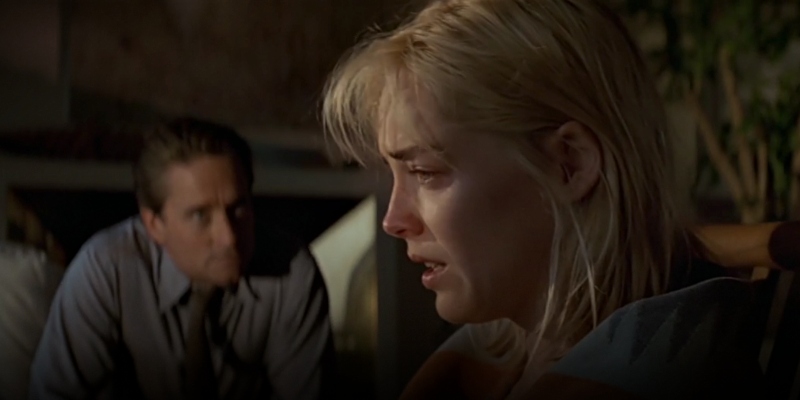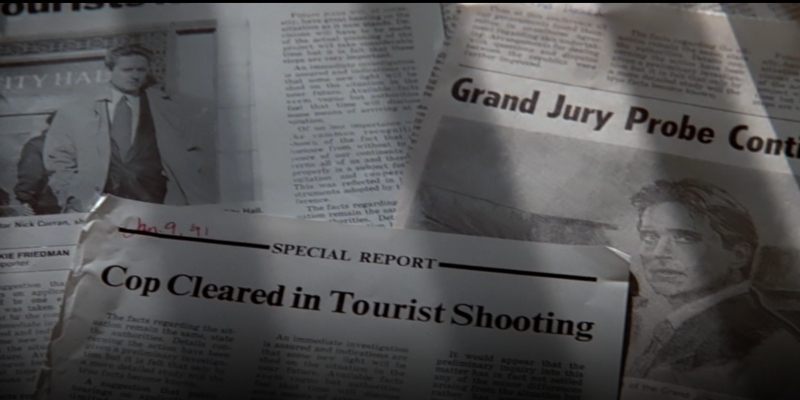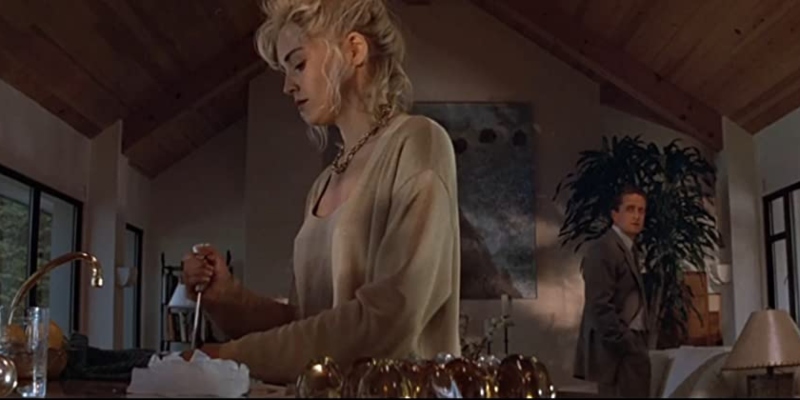Writing Lessons from Author-Seductress Extraordinaire Catherine Tramell
As Basic Instinct Turns 30, Blake Turck Celebrates an Unlikely Inspiration
The first time I ever heard the phrase “suspension of disbelief” wasn’t from a teacher or in a book. It was Sharon Stone explaining it to Michael Douglas from the back of a police car. “It teaches you to lie,” she explains. “You make stuff up, and it has to be believable.”
My writerly aspirations originated not between the pages of Louisa May Alcott or Charlotte Bronte, but from a mysterious blonde woman who left an indelible mark on my psyche from the moment I saw her on screen. Thirty years later, Basic Instinct’s Catherine Tramell is still one of the greatest femme fatales in cinema. She’s beautiful, brilliant, and wealthy, with a mystery behind her ice queen demeanor. Also, she may or may not be a serial killer.
As we quickly learn in Paul Verhoeven’s 1992 film, Catherine writes thrillers, has a PhD in psychology, and is possessed with an unbridled self-assuredness. She calls sex “fucking” and prefers doing it for pleasure over love—an attitude usually reserved for and expected from men, which in turn astonishes the men investigating her for murder. She’s sexually fluid, eschews undergarments, and enjoys light bondage. Today, female sexual liberation is more empowered than chastised, but in the 90s, a woman who had carnal desires necessarily had to be portrayed as evil—hence films like The Last Seduction, Poison Ivy, and Basic Instinct itself.
For me, there were other, more compelling aspects to the character: I defined her as a writer before a seductress. Perhaps 37-year-old Catherine wasn’t the typical inspiration for a 13-year-old girl, but seeing her triggered something, a part of me that, until then, had only been satiated by Nancy Drew hardcovers from the flea market. I saw myself in the young would-be detective. But once I met Catherine, my interest shifted from solving mysteries to creating them. (I also tried emulating her looks, dyeing my natural red hair platinum blonde with unfortunate results—but that’s another story.)
As Basic Instinct turns 30, let’s celebrate the writing lessons we can glean from Catherine Tramell.

Lesson #1: Everything might be copy, but don’t be an asshole
In the infamous interrogation scene, Catherine, surrounded by a room full of darkly lit men, responds to claims that she slept with the murder victim solely for research. “I’m a writer—I use people for what I write. Let the world beware.” I’m neither a sociopath nor a brilliant seductress, but this quote has been seared into my brain since the 90s—a sassier, R-rated version of the Nora Ephron reminder that “everything is copy.”
Catherine’s books (The First Time, Love Hurts, and Shooter) dangerously blend the connection between art and life, each mimicking events in her own past (whether this is coincidence or planned is never confirmed). Immediately upon meeting Detective Curran (Michael Douglas), she says he’s the inspiration for her latest manuscript about a disgraced cop who falls for the wrong woman… and then she kills him.
Ephron’s famous idiom tells us that real life is the best inspiration for a writer, and in turn, anyone and anything is fair game—though as we know, this mentality can come with its own set of issues. Catherine’s incapable of forming relationships with anyone outside the context of using them for her work, pointing to the real-life perils of seeing everything in your life through the lens of potential content.

Lesson #2: Use your grief
Catherine’s novel The First Time is about a boy who kills his parents to see if he can get away with it. After revealing this to a suspicious Detective Curran, she admits that she wrote it after the (allegedly accidental) boat crash that killed both her parents. It’s another example that suggests she might be a serial killer—but it could also signify a writer channeling her personal grief into her fiction.
Today, my writing teacher and mentor tells her students to take painful things from our lives and turn them into beautiful stories. But years before I ever took her class or tried to pen a personal essay, Catherine taught me that the best way to write is to pull from your real-life experiences—which helped inspire me to take the leap into personal writing years later (including how my lifelong obsession with sexy mysteries has helped me through stressful times, such as IVF treatments).

Lesson #3: Find your people
At one point, Detective Curran, now bordering on obsession with Catherine, confronts her about her circle of dubious friends, which includes her lover Roxy and older friend Hazel, both of whom harbor dark pasts: they murdered their families when overwhelmed by a mysterious “urge.”
Catherine explains this simply, saying that she surrounds herself with those who provide insight into her characters, and even inspire creativity. It’s another part of the writer’s process that draws parallels to a widely espoused writing tip, one that changed my career: seek out those with similar interests and aspirations. Of course, this pertains to writers, not reformed murderers. Yet the tangible takeaway remains—finding your writing community is one of the best ways to hone your passion and talent.

Lesson #4: Do your research
Catherine’s workspace is a writer’s desk or a serial killer’s obsession wall, depending on how you look at it. In movies, the proverbial box of evidence revealing the killer’s guilt is always discovered in the third act. But Catherine’s treasure trove of information on the troubled Nick—news clippings about the tourists he accidentally killed, and endless personal information—are all dismissed as an author at work. This can be construed as sinister, or maybe just a practical journalism tip.

Lesson # 5: Kill your darlings (or not)
Attachment to a person or memory can make writing difficult for even the most brilliant minds. In that case, reference Catherine Tramell; she never allows emotions to interfere with her process. After their passionate tryst, Nick arrives at his lover’s house only to be (initially) dismissed: “My book is finished,” Catherine says. “Your character is dead.” But for the first time, she breaks her own rules—a final lesson from the authoress extraordinaire.




















